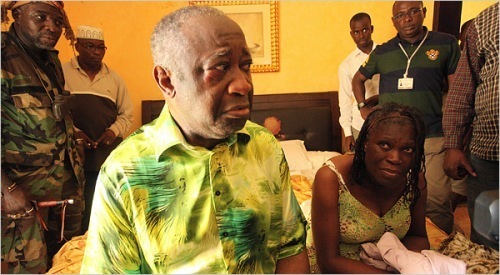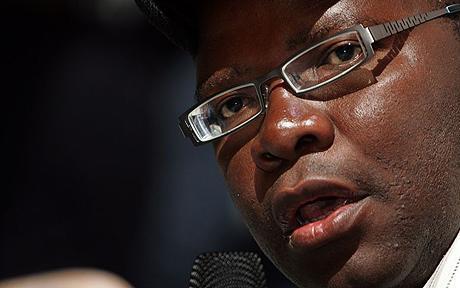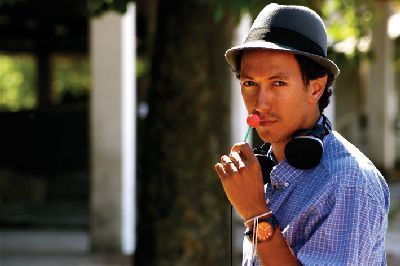Sean Jacobs's Blog, page 656
April 20, 2011
Dick Chimp
The blog Dictator Chimp answers the crucial questions, reveals the answers to puzzling dilemmas facing the ordinary brutal autocrat. Nothing is too simple a question, and nothing too complex.
"Should I grow a beard?" is answered with a firm affirmative, with a link to twin images of Saddam Hussein: (a) when he was in the prime of mustachio'd-dictating, and (b) in post-US detention/"inspection" full-beardedness—cleaned up for the courts, and a haunting, terrifying loneliness inhabiting his unfocused eyes.
He tells you what to do when your realise that your revolting peasants may be far smarter than you first thought, deliberates on whether a dictator should plunder the nation's coffers or accept the $5mil from the Ibrahim Prize, "… which you can win if you just run your country like everyone expects, and then step down when the 'constitution' says you should."
Lately, he's alerted readers to Chris Roper's article in South Africa's Mail and Guardian, which is "undoing a lot of good work" by pointing out "the rise of aspiring dictators in South Africa…[noting] striking similarities between them and Ernst Röhm, a Nazi leader that Hitler bumped off on his way to the top."
Others questions: "I don't have a country yet, but I want to be a dictator. Where do I start?"
Find out how here.
–Neelika Jayawardane








Madonna choses Malawi
Kim Yi Dionne is an assistant professor of political science at Texas A&M University. She writes for AIAC about recent coverage of Malawi, actually Madonna in Malawi (that's the problem). Kim also blogs about Malawi, politics, and HIV/AIDS at the blog, haba na haba. You can also find her on Twitter–Sean Jacobs.
Kim Yi Dionne
Guest Blogger
Malawi has been in the headlines of mainstream media outlets in the past couple of weeks. Was it because of a growing concern about the deteriorating human rights and governance situation? No. You guessed it: a story set in Malawi was on The New York Times landing page a few weeks ago because of Madonna.
For anyone who doesn't know the Madonna-Malawi connection, Madonna adopted a son, David Banda, from Mchinji in central Malawi in 2006 and a daughter, Mercy James, from Zomba in the south of the country in 2009. In 2006, she started filming a documentary that was shot in Malawi, I Am Because We Are. (The film was released in 2008). Also in 2006, she founded Raising Malawi, an organization whose stated mission is "to bring an end to the extreme poverty and hardship endured by Malawi's 2,000,000 orphans and vulnerable children once and for all." (1)
The recent hubbub about Madonna has been about the mismanagement of funds of Raising Malawi's primary project, the Raising Malawi Academy for Girls (2). Having raised $18 million and spent $3.5 million, there was still no school built, no teachers hired, and no girls selected to attend the small, private academy. The New York Times was the first to break the story (unless, of course, you read Malawian newspapers, which reported on the oddities surrounding the pop star's school two months earlier), but other media outlets continue to report on the unfolding saga (e.g., Newsweek, The Guardian, The Mirror, USA Today, New York Daily News).
I could go on for pages about bad celebrity aid, the celebrity scramble for Africa, and the concomitant media reporting on celebrities "saving Africans," but those arguments have been well articulated elsewhere.
Suffice it to say, much as I loved the Material Girl when I was a kid, I'm not a big fan of the work Madonna does in Malawi.
I think she's actually bad for the country, especially as she commands such a presence in the international media. Friends of mine who know I do research in Malawi contend that she's harmless: even if she's wasted millions of dollars, that money didn't come from Malawians. True enough. But the corruption surrounding Raising Malawi has left a pockmark on Malawi, one that has been aired in the international media, only because of Madonna's fame.
One aspect of the The New York Times story bothered me in particular: the reporting on the "extravagant compensation" of the academy's director in Malawi. That characterization hardly seems fair. Principals/headmasters of elite schools around the world are often well-paid with benefits befitting the position. In the case of Anjimile Mtila-Oponyo, the compensation was standard for executive directors of major NGOs in Malawi (and for her, it was a paycut from her previous positions at the World Bank and United Nations). Here is an excerpt of an email from Mtila-Oponyo shortly after the NYT article was published:
They warned us that they would go to the press and indicate that I was getting an international salary in Malawi. A company car, driver, golf club membership are standard for CEOs in Malawi but they seem like extravagants in the USA… Kindly note there was no mismanagement. Money was managed in LA and not in Malawi. No money for the school came to Malawi.
The New York Times' characterization of Mtila-Oponyo's compensation is unfortunate for two reasons:
It implicates Malawians were engaged in the corruption of Raising Malawi's misspent millions, when the focus should really be on where the money was spent irresponsibly, and where the bulk of that money was spent–which was the US operations, not those in Malawi.
The article suggests that things can be done in Malawi on the cheap. Just because a country has extreme poverty, that doesn't mean that conducting business there should therefore be inexpensive. Malawi is an expensive place to do business precisely because of the lack of development (i.e., little infrastructure).
So, thank you, New York Times for bringing attention in the West that Madonna shouldn't be doing work in Malawi. Maybe she'll get discouraged and stop bringing shame to the Warm Heart of Africa. But then again, if you didn't report on Madonna in Malawi, we might only rarely see the country mentioned in The New York Times (exception: the occasional but solid reporting by Celia Dugger). I'm not sure which is worse: Americans not knowing anything about Malawi, or Americans knowing only that it's the place where Madonna adopted two children and wasted millions of dollars on a school that was never built.
Footnotes:
(1) The 2008 Census estimated there were 837,300 orphans in Malawi.
(2) Though the Academy has been scrapped, you can still purchase a ceremonial brick on Raising Malawi's web site to help raise money for the school.
* BTW, the title of this blog post references Madonna's response when people ask why she chose Malawi, to which she replies, "Malawi chose me." Um, I'd like to see some evidence of that.








April 19, 2011
International Death Metal Month

I won't be able to tell the difference between just heavy metal or death metal. But I had to post this link to a video of Botswana death metal band Wrust, on All Metal Resource.
Via Ethan Zuckerman








Tendai Biti @ Columbia University
Elliot Ross, Guest Blogger
Tendai Biti tells the story of being on a plane to an international conference with Robert Mugabe. Mugabe approached his finance minister and prodded his shoulder accusingly. "Biti," he said. "Your trouble is that you forget that we are a sovereign state."
"No," replied Biti, unflinching in his retelling of the exchange at least, "we are part of a global community."
The man charged with running the Zimbabwean economy, a job he once called the hardest in the world, was in New York last week, sharing a platform at Columbia University with Nobel Laureate Joseph Stiglitz and the writer Peter Godwin.
The task Biti faces today is identical with the one he began to tackle as a student activist in the late 1980s. His life's ambition – then as now – is to reverse permanently a national history he understands as an unrelenting tale of "state-imposed thuggery" stretching back to the earliest period of colonization.
"We must find our own, fundamental, Jeffersonian principles," he says.
"And we must take violence out of the political landscape."
Without the historical backdrop of what he calls "the vandalized state" to remind us of his radicalism, Biti's hopes for Zimbabwe might sound banal. He wants a constitution based on peaceful political process and the mistrust of power, a strengthening of domestic institutions, participation in a "global village," and the enforcement of international law. Biti jokes that he is still a Marxist, but, striving as he is to bring
Zimbabwe out of its three decades long nationalist malaise, his demands are those of a liberal.
Both Biti's diagnosis of Zimbabwe's troubles and his ambitions for the country's future are concerned with international law. In globalism he sees the promise of "certain minimum standards," a promise too often unfulfilled. "International law has failed Africa," he says. "The UN has failed Africa."
He dismisses UN Charter article 2(7) – the doctrine of non-intervention – as outmoded. He adds that he hopes the doctrine is abolished soon, perhaps with the upcoming elections in mind.
Zanu PF's hold on power depends on how much cash it can bring in from outside the country. Most thought that Zimbabwe had nothing more to sell off, but in the alluvial diamonds of the Chiadzwa fields, Mugabe has found one big final pay-check.
There have been a couple of major diamond sales since Chiadzwa stones were cleared for legitimate sale under the Kimberley Process. and Biti was previously on record as not having seen a cent of diamond money enter his national coffers. Last week he confirmed that some money had come into the treasury, but added: "I've no doubt it's not 'the full monty.' There are lots of leakages. There are big fish that are stealing."
Among the biggest of those fish is China, which has built an air-strip at Chiadzwa and whose state weapons manufacturer Norinco has long been shipping arms to the country. Biti cited Dambisa Moyo's chapter in 'Dead Aid' as the most prominent case of dangerous "romanticism" about China and the Chinese in Africa, but was reluctant to go into much detail.
"You know, I love Chinese food," he said, smiling, "so I should be careful about what I say."
* Elliot Smith is a graduate student at Columbia University.








Duke Ngcukana
In the last year fans of South African jazz had to contend with the passing of musicians Robbie Jansen, Ezra Ngcukana (in August 2010), Vincent Kolbe (in September 2010) and Hotep Idris Galeta. This weekend Duke Ngcukana, brother of Ezra and himself a musician and jazz educator of note, passed away.
Read a news story about Ngcukana's passing–in a local Cape Town daily newspaper–here.
The image, above, of Duke and the late Winston Mankunku Ngozi, was taken by photographer and journalist Fanie Jason in 2006. Jason posted some of his photographs of Duke, dating back to the mid-1980s, in a tribute to Duke on Facebook.








April 18, 2011
Music Break
If you're wondering who will replace the coward Amr Diab as international Egyptian superstar (who has recently resurfaced, tail between legs, with a song honoring the revolution), check out the younger, cuter singer Hamada Helal. His latest (above) is, "The 25th of January Martyrs".








Oliver Hermanus at Cannes
"Skoonheid," the new film by director Oliver Hermanus (born in Cape Town, South Africa) will be screened in the Un Certain Regard section of this year's edition of the Cannes Film Festival (starting next month). He is in good company. Check the Cannes site to see who else got invited.
The film is also the first Afrikaans film to be included in Cannes Film Festival's official program. The film–the title translates as "Beauty"– "… tells the story of Francois van Heerden, a mid-40s, white, Afrikaans-speaking family man living in Bloemfontein, who has become devoid of any care or concern for his own measure of happiness, and so convinced of his ill-fated existence, that he is wholly unprepared when a chance encounter unravels his clean, controlled life."
I like the film language of Hermanus (he studied film at the University of Cape Town, UC Santa Barbara and the London Film School), so I'm looking forward to seeing it whenever. Hermanus' debut film, "Shirley Adams," which I saw at the New York African Film Festival last year, a claustrophobic film about the desperate lives of a working class woman and her disabled son, is definitely worth a look.
Sources: Film Contact, Festival du Cannes, Screen Daily








Miss Liberia
Street Party, Johannesburg
The series Security [by photographer Mikhael Subotzky] takes as its subject the guards employed for protection by the middle and upper classes in wealthy districts of Johannesburg. It includes a watched-over street party and a visual catalogue of the garden sheds or 'Wendy houses' that guards sit in to defend the houses and properties of their employers.








'The Future' in Nigeria
Sean Jacobs's Blog
- Sean Jacobs's profile
- 4 followers


























